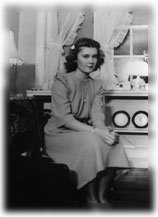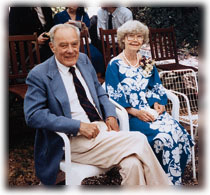Main Menu · Search ·Current Issue ·Contact ·Archives ·Centennial ·Letters to the Editor ·FAQs
 Maclin Bocock, age 19, in the spring of her freshman year at Radcliffe: a veteran of struggle, humiliation, amazement, and pleasures. Maclin Bocock, age 19, in the spring of her freshman year at Radcliffe: a veteran of struggle, humiliation, amazement, and pleasures. |
More than 60 years? Is it possible that so much time has vanished since that September morning when, excited but apprehensive, I boarded the Chesapeake and Ohio in Williamsburg, Virginia, on my way to Cambridge and Radcliffe?
I had applied after all entrance exams had been given, but Mrs. Small, a close family friend who lived in Cambridge, persuaded my parents to let me try for late admission. I had been valedictorian, but that meant little in a class of only 30 students. I was ill-prepared, the more so because Southern high schools offered only 11 grades. I must have been accepted because of Mrs. Small's word on my behalf. Perhaps the fact that I came from a distance also helped. A Boston paper published a picture of a freshman from Minnesota, one from California, and me, with the headline, "Foreigners Register at Radcliffe." A preponderance of the students came from New England, and the College wanted to diversify.
I signed up for five courses, one more than the norm. The first class I went to was English 1, given by Howard Mumford Jones, a lively lecturer who wore a Norfolk jacket and jingled the loose change in his pocket. At the first lecture, I sat back to enjoy the hour. Suddenly I noticed that the students around me were writing at a great rate and only occasionally looking up at the professor. I finally realized I was supposed to take notes on what was said, but I had come without pen or paper.
 Albert Guérard and Maclin Bocock Guérard in a recent photograph from California. Albert Guérard and Maclin Bocock Guérard in a recent photograph from California. |
By the third week in October, I was so overwhelmed that I was in despair. Both English 1 and History 1 had long reading assignments and weekly quizzes that I either flunked or nearly flunked. And I was not sophisticated enough to appreciate the eccentric Greek professor. One morning he announced in an exasperated voice, with not the slightest hint of levity, that he had been able to give our parents two lessons at each class, but we seemed able to manage only one and that not very well. I decided I would have to give up the course, and my petition was granted.
That hardly brought relief. I still found it impossible to get all the reading done for English and history and prepare for the weekly quizzes. After it turned out that only one member of my English 1 section identified Gringolet as the Green Knight's horse, I should have felt better, but I didn't. Not only had the other students had one more year of high school, many had been to private schools. They spoke of books I had never heard of and sometimes seemed to have read them twice. Could I drop another course?
I made an appointment with Dean Frances Ruml Jordan. According to my small black Coop book, I entered her office at noon on Monday, November 14. I held out my hand, but hers was not forthcoming.
"You little fool! Do you think you can stay here and carry only three courses?"
I had never seriously been called a fool before, but since arriving in Cambridge I had more than once felt like one. I explained my reasoning: by midyears, I would have learned better how to study and would be able to handle five courses during the second semester.
Out of the question! Against all regulations!
Years later I came to know Frances Jordan as an amusing and friendly person. But she certainly gave no hint of that in her office that day. She had every right to be annoyed with what must have seemed an unreasonable, willful young woman. But fortunately she did not let the matter drop. She telephoned Mrs. Small--I was living with the family--and asked if I was always used to having my way. When Mrs. Small answered, "Quite the contrary," and assured her I was studying so hard that sometimes it was difficult to get me to stop for meals, Dean Jordan relented and I dropped French C.
At some point that year I discovered Wolff's Tutoring Bureau and subscribed for notes to History 1. It was the bureau, I am sure, that kept me from having a nervous breakdown. Weekly I went to the office in the Square and picked up sheets (smelling heavily of ink) that summarized salient facts in the assigned reading. My quiz grades rose and climbed even higher when I struck on the idea of trying to guess what the short essay question would be, then writing and memorizing my answer ahead of time. More often than not I hit on the topic, or near enough so that I could present my prepared paragraph. If I guessed wrong, I used it anyway, hoping for credit for knowing at least something about the week's work.
My inability to spell, however, severely plagued me. My quizzes must have afforded the section man, Mr. Popper, some amusement. One word circled in red caused me special embarrassment: champagne. I was referring to one of Charlemagne's battles.
By midyears I had learned to study and to cut corners, and felt reasonably confident that I could manage five subjects in the second semester if I chose those without papers or midterms. The reading list for Professor Samuel Hazzard Cross's Slavic 1 opened more doors than any other course I took at Radcliffe. ("Doc" Davidson's Music 1 ranked second.) That semester I developed a fascination for the Russians and their literature that has never left me. But again I was caught short. I did not have time to read either War and Peace or Anna Karenina. I concentrated on Gogol, Turgenev, Dostoevsky, Goncharov, and Chekhov, and prayed there would be choices among the essay questions. From this distance, I remember four questions on Tolstoy, none of which I could answer. Alas, failure was sure! Dean Jordan would hardly be as tolerant again. But the fact that my days at Radcliffe were numbered no longer made me feel as desperate as I had in the autumn. I had been exposed to exciting and strange worlds and would carry with me myriad images and ideas when I retreated to some less demanding college.
When the self-addressed postcard I had handed in with my bluebook arrived, I could hardly believe what I saw. A C! The person who corrected my exam was obviously imaginative enough to realize that here was someone hooked on Russian literature and that I would sooner or later get around to reading Tolstoy.
That first year of my enlightenment was not all struggle and humiliation and amazement. There were new friendships and other pleasures: the discovery, for instance, of Filene's Basement. We still speak from time to time about special bargains lovingly remembered--a Saks cashmere jacket or velvet evening gown. And there was my first Cambridge spring. How different it was from the South's slow unfolding season. Almost from one day to the next, winter was summarily dismissed.
I somehow managed to survive those nine months. But my inability to spell followed me into my sophomore year.
That November, at a Leverett House dance the night of the Yale game, I met Albert Guérard, an instructor in the English department. Soon thereafter I received a typed note on department stationery, signed by my tutor, instructing me to read all of Shakespeare and The Faerie Queene for the next week's session! After my initial shock, I realized who had written it. In February I received another letter on the same stationery. Three of my professors had reported my poor spelling on the midyear exams, so I was to appear at Longfellow Hall with my bluebooks. The letter was signed with an unlikely name, Mr. Dudley Cloud; he would try to help me with my spelling. I assumed, of course, that Albert had written that one, too.
There was snow on the ground the day of my appointment, and before entering Longfellow Hall I scooped up a snowball. When I opened the door of the designated room, I saw immediately that the gentleman sitting with his back to me was not Albert--and quickly stuffed the snowball in my pocket, where it began to melt and drip. At some point I simply told Mr. Cloud what I had in my pocket and that I would like to get rid of it. I remember seeing cars moving along Garden Street as I let the snowball drop out the window, and wishing I were in one of them.
I would like to have a recording of that meeting. No, I had not brought my exams. In those days I still had what so many Southerners have, the ability to keep talking. But what did I say? I couldn't tell the truth. I might get Albert in trouble, or at least embarrass him. I wasn't sure that any of his colleagues knew about me.
Several years later, after our marriage, Albert and I lived in the same building as Helen Jones, the English department's secretary, and I became good friends with her. I mentioned that embarrassing conference in Longfellow one day, and she began to laugh. "So you were the person!" Apparently Mr. Cloud had gone directly to the department from his encounter with me. All but unhinged, he told Helen he had just had a conference with the strangest girl he ever hoped to meet.
The case is still hopeless. I kept count while writing these pages. The dictionary was consulted nine times and Albert twice.
~ Maclin Bocock Guérard